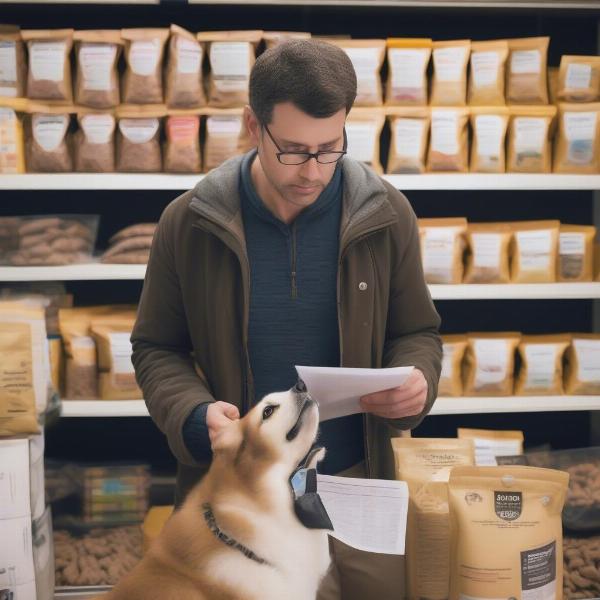Digestive upset in dogs can be distressing for both pet and owner. Finding the right dog food for gastrointestinal problems is crucial for managing these issues and getting your furry friend back to feeling their best. Whether your dog suffers from chronic conditions like inflammatory bowel disease (IBD) or experiences occasional bouts of diarrhea or vomiting, choosing a specialized gastrointestinal (GI) diet can make a world of difference. This article delves into the importance of GI dog food, how to choose the right formula, and what to look for in a quality product.
Understanding Gastrointestinal Issues in Dogs
Several factors can contribute to digestive problems in dogs, ranging from food sensitivities and allergies to infections and more serious conditions like pancreatitis. Symptoms can vary but often include vomiting, diarrhea, gas, loss of appetite, and weight loss. If your dog exhibits any of these signs, a visit to the veterinarian is essential to determine the underlying cause and develop a suitable treatment plan. Often, this plan involves a switch to a specialized diet.
 Choosing food for dogs with digestive disorders
Choosing food for dogs with digestive disorders
Choosing the Best Dog Food for Gastrointestinal Problems
Selecting the right gastrointestinal dog food requires careful consideration of your dog’s specific needs and the veterinarian’s recommendations. gastro intestinal dog food comes in various forms, including dry kibble, wet food, and even prescription diets.
Key Ingredients to Look For:
- Highly Digestible Proteins: Look for single-source protein options like hydrolyzed protein or novel proteins (such as venison or duck) that are less likely to trigger allergic reactions.
- Fiber Sources: Both soluble and insoluble fiber play crucial roles in regulating digestion. Look for ingredients like beet pulp, prebiotics (like FOS and MOS), and psyllium.
- Low Fat Content: Fat can exacerbate digestive issues. Opt for a royal canin gastrointestinal low fat dog food if your vet recommends it.
- Probiotics and Prebiotics: These ingredients promote a healthy gut microbiome, which is crucial for proper digestion.
What to Avoid:
- Artificial Colors, Flavors, and Preservatives: These can irritate the digestive system.
- Common Allergens: Ingredients like beef, wheat, corn, and soy are common culprits in food sensitivities.
- Excessive Fat: As mentioned earlier, high-fat content can worsen digestive issues.
Transitioning to a New Food
Switching to a new food should be done gradually to avoid further upsetting your dog’s stomach. Start by mixing a small amount of the new royal canin gastro dog with their current food, gradually increasing the proportion of the new food over several days.
Monitoring Your Dog’s Progress
Once your dog is fully transitioned to the new food, closely monitor their stool consistency, appetite, and overall energy levels. Any signs of worsening symptoms should be reported to your veterinarian immediately.
When to Consult Your Veterinarian
While GI dog food can significantly improve digestive health, it’s crucial to remember that it’s not a replacement for veterinary care. If your dog’s symptoms persist or worsen, consult your vet immediately.
Conclusion
Choosing the right dog food for gastrointestinal problems is an essential step in managing your dog’s digestive health. By understanding the key ingredients to look for and working closely with your veterinarian, you can help your furry friend enjoy a happier, healthier digestive system. Remember, a healthy gut is a key to a happy dog.
FAQs
- What are the most common signs of gastrointestinal issues in dogs? Common signs include vomiting, diarrhea, gas, loss of appetite, and weight loss.
- How long does it take to see improvement after switching to a GI diet? Improvements can be seen within a few days to a week, but it may take longer for some dogs.
- Can I give my dog human food while they are on a GI diet? It’s best to avoid human food while your dog is on a specialized diet, unless specifically recommended by your vet.
- Are all gastrointestinal dog foods the same? No, they vary in ingredients and formulations. Consult your vet to find the best fit for your dog.
- What is the difference between a GI diet and a regular dog food? GI diets are specifically formulated with highly digestible ingredients and often contain added fiber and prebiotics to support digestive health.
- Can puppies eat GI dog food? There are specific GI formulas for puppies. Consult your vet for appropriate recommendations.
- Is royal canin gastrointestinal wet dog food better than dry food for GI issues? Both wet and dry food have their benefits; your vet can help you determine which is best for your dog.
ILM Dog is a leading online resource for dog owners worldwide, offering expert advice on all aspects of canine care, including breed selection, health, training, nutrition, and more. We are committed to providing reliable, practical information to help you navigate the joys and challenges of dog ownership. For further assistance with your canine companion, contact us at [email protected] or call +44 20-3965-8624. Visit ILM Dog for more expert advice and guidance.